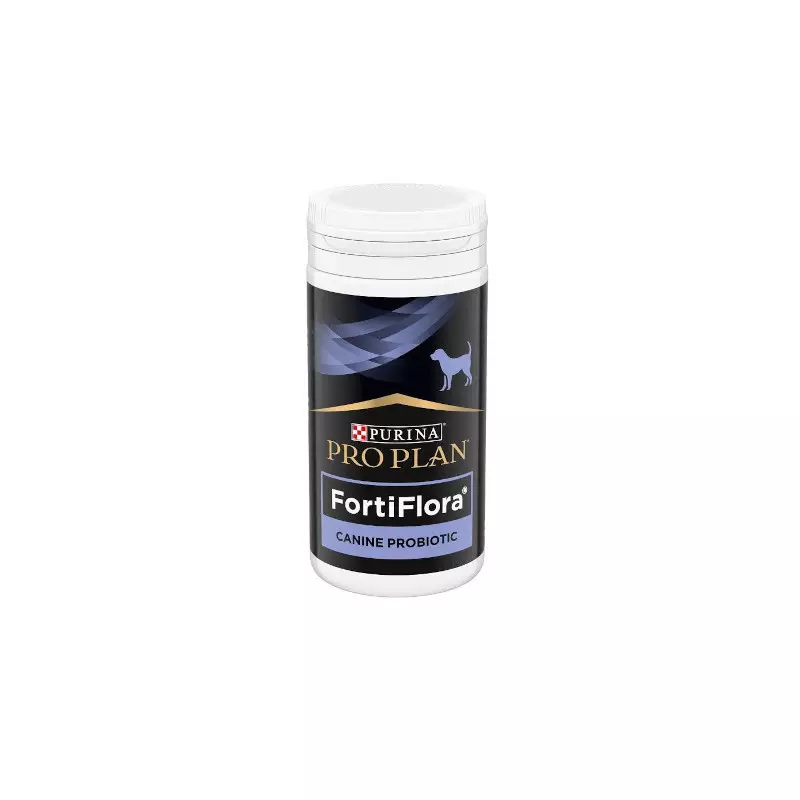

.....WHATSAPP ONLY ![]() 0808406035
0808406035
.....WHATSAPP ONLY ![]() 0808406035
0808406035
Purina FortiFlora for dogs of all breeds
When to use Fortiflora
- Gastroenteritis and diarrhea associated with an imbalance of the microflora
- Diarrhea associated with stress, antibiotic therapy and dietary changes
- Acute enteritis
- Poor quality of feces in puppies
CONTRAINDICATIONS
• Specific food allergies
KEY BENEFITS
- Contains a guaranteed level of a particular strain of the vital probiotic SF68® (minimum 5 x 108 CFU * / g). A patented microencapsulation process increases stability, ensuring a consistent presence of live beneficial bacteria in the GI tract.
- Proven efficacy for intestinal well-being and balance with Enterococcus faecium SF68® lactic acid bacteria, integrated at levels that ensure normal intestinal well-being and microbial balance in dogs.
- Proven efficacy for strengthening the immune system
to help preserve the patient's health.
Canine FortiFlora
Key nutritional values Enterococcus faecium SF68® microencapsulated live microorganisms Minimum 1x108 CFU / g:
Protein 45%, Fat 15%, Fiber 0.5%, Vitamin E 6000 mg / kg, Vitamin C 4375 mg / kg, Beta-carotene 500 mg / kg, Metabolizable energy (EM) * 3.9 kcal / g.
INGREDIANTS
Animal hydrolysates, Enterococcus faecium SF68 vitamin C, vitamin E, beta-carotene, zinc proteinate, sodium chloride, manganese proteinate, iron sulphate, copper proteinate, calcium iodate, sodium selenite.
RECOMMENDED DOSES
It is recommended to administer one sachet of FortiFlora® per day, sprinkling the contents on the dog's usual food for a period of 30 days, even if the clinical signs have disappeared. It can also be consumed for long periods. FortiFlora ™ can be safely administered to smaller puppies as well as to bitches during pregnancy or lactation. When using Fortiflora® to restore intestinal balance compromised by antibiotic therapy, it should be administered before, during and after such treatment, but preferably at times other than the antibiotic itself.
Clinical use of probiotics in dogs
Probiotics are defined as living organisms which, when supplied in appropriate doses, produce an effect
beneficial on the health of the host. Effective probiotics must be1,2:
- Not pathogenic.
- Resistant to gastric and intestinal digestion.
- Able to adhere to the intestinal epithelium.
- Able to positively interact with the gastrointestinal flora.
- Able to act on the host's immune responses.
Important scientific research has contributed to a better understanding of the value of
probiotics in the treatment and prevention of a number of disorders2-4. The probiotics studied
more in depth are strains of Lactobacillus, Bifidobacterium, Enterococcus and Saccharomyces2-
5. The beneficial effects of probiotics can be species-specific and strain-specific.
To ensure adequate vitality of the organism, it is necessary to use very accurate methods of
production and stabilization.
BENEFIT EFFECTS OF PROBIOTICS
Probiotics have two specific mechanisms of action, but both of their interactions are
diverse and articulated:
- Modification of the bacterial flora of the intestinal tract, for example by:
- The inhibition of the growth of pathogenic bacteria.
- Inhibition of the adhesion of pathogenic organisms to the intestinal epithelium.
- The production of bacteriocins (proteins that inhibit other bacteria).
- Increased mucus production.
- The reduction of the luminal pH.
- Modulation of the immune system, for example by:
- The binding to Toll-like receptors and the stimulation of innate immune responses.
- The improvement of the function of the epithelial barrier (including the reduction of permeability).
- The increase in IgA production and adequate immune responses.
- Modulation of cytokine responses to reduce excessive inflammation.
No customer reviews for the moment.